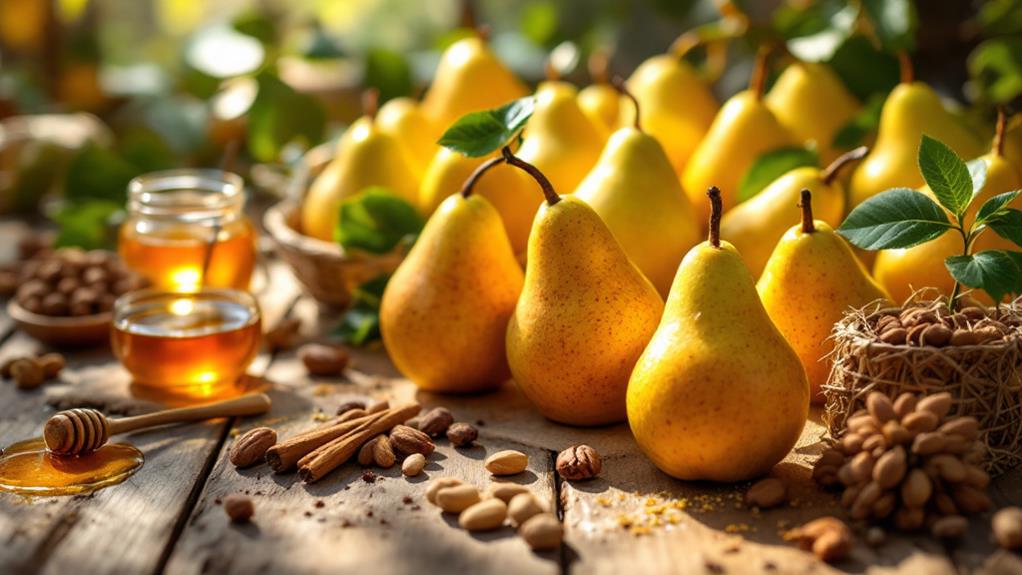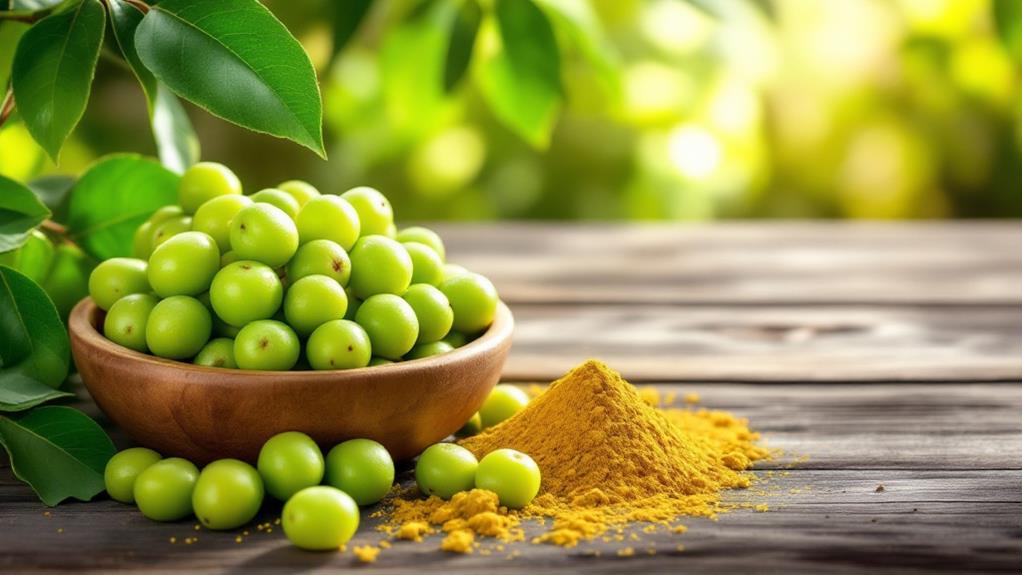What Is Jambolan (Java Plum)? Health Benefits and Uses
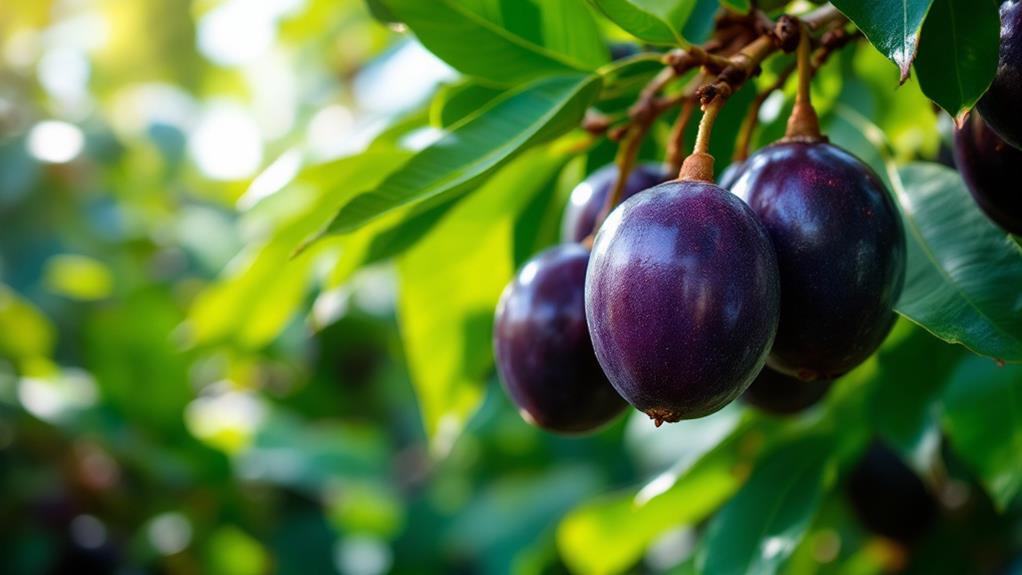
You'll find that Jambolan, also known as Java Plum, is a nutritious fruit native to the Indian subcontinent. It's packed with vitamins, minerals, and antioxidants that support overall wellness. Jambolan is revered in traditional medicine for improving insulin sensitivity and maintaining healthy blood glucose levels. It's also used in Ayurveda for digestive health, wound healing, and as a natural cooling agent in summer. While generally safe, it may lower blood sugar considerably, so caution is advised if you have diabetes. Curious about its many uses and benefits? There's more to investigate about this versatile plant.
Understanding Jambolan
Jambolan, also known as Eugenia cumini, is a tropical tree native to the Indian subcontinent, renowned for its medicinal properties. You might know it by its fruit, the Java Plum, which is rich in vitamins, minerals, and antioxidants. These nutrients are key players in managing blood sugar levels, a vital aspect for those dealing with diabetes. Jambolan's health benefits are well-documented, particularly its role in improving insulin sensitivity and regulating blood glucose, thanks to its anti-hyperglycemic effects.
In folk medicine, every part of the jambolan tree—its seeds, leaves, bark, and fruit—is utilized for its healing potential. The seeds are especially noted for their ability to manage diabetes, offering a natural alternative or supplement to conventional treatments. This tree's medicinal properties extend beyond just blood sugar control; it's been traditionally used to treat a variety of ailments, demonstrating its versatility and significance in natural health practices.
Traditional and Cultural Uses
Often celebrated for its rich cultural heritage, the Java plum, or jambolan, holds a special place in traditional medicine systems like Ayurveda and Unani. You'll find that Syzygium cumini is more than just a fruit; it's a storied component of these ancient practices. Revered for its potential to address digestive disorders, jambolan is a key player in maintaining health within these systems. Known as the "Fruit of Gods" in Hindu mythology, its cultural significance stretches far and wide, often appearing in festivals and rituals across the Indian subcontinent.
In Ayurveda, jambolan's leaves are applied externally for treating wounds and skin issues, highlighting its multifaceted uses. The bark's astringent properties make it a valuable part of herbal preparations, contributing to its longstanding role in traditional medicine. In the heat of summer, its cooling effects are cherished, making it a popular choice for invigorating beverages.
Folk medicine also celebrates jambolan, with its seeds believed to improve libido and fertility. This rich tapestry of traditional and cultural uses underscores how jambolan seamlessly integrates into both the medicinal and cultural fabric of societies that hold it dear.
Health Benefits
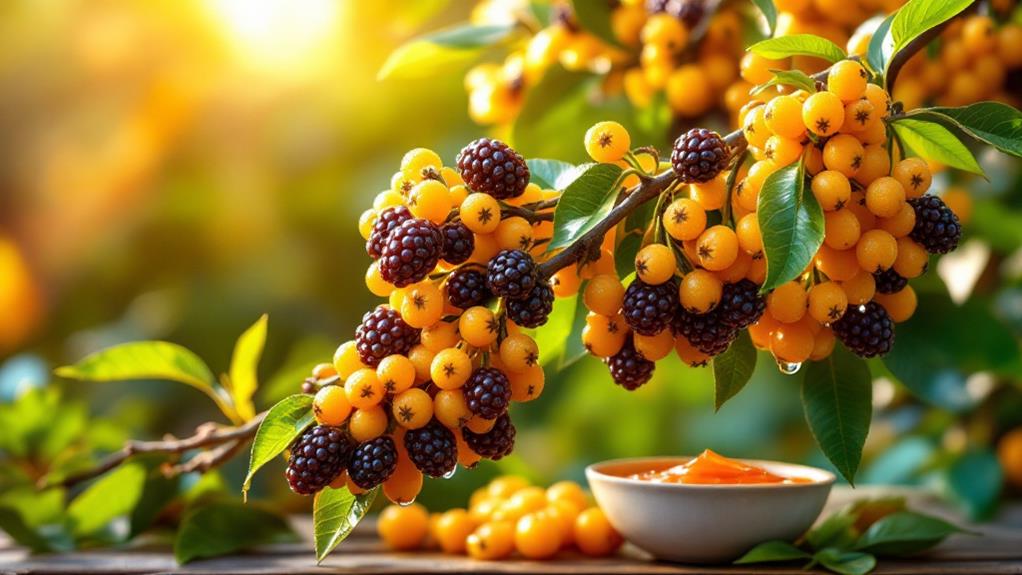
Packed with antioxidants, particularly anthocyanins, the Java plum offers significant health benefits, especially for those managing diabetes. As a natural powerhouse, Jambolan, or Syzygium cumini, is renowned for its ability to aid in blood sugar control due to its hypoglycemic effects. It's not just about diabetes management; Jambolan extends its benefits further. Here's why you might want to contemplate it:
- Antioxidant Enhancement: The high levels of antioxidants in Jambolan reduce oxidative stress, potentially improving insulin sensitivity and overall well-being.
- Nutrient-Rich: With vitamin C, potassium, and dietary fiber, Jambolan supports heart health, boosts immune function, and promotes digestive regularity.
- Anti-inflammatory Properties: It may help alleviate conditions like arthritis and asthma, offering relief from inflammation-related issues.
- Digestive and Wound Healing Aid: Traditionally used for digestive issues like diarrhea and dysentery, Jambolan's leaves also assist in wound healing when applied externally.
Potential Side Effects
When considering Jambolan for its health benefits, it's important to be aware of the potential side effects. While generally deemed possibly safe at medicinal doses, such as tea made from 2 grams of leaves per liter of water for short-term use, there are some concerns to keep in mind. You might experience mild gastrointestinal disturbances, like nausea or diarrhea, particularly if you consume large amounts. These side effects, though generally mild, can still be uncomfortable.
If you're managing diabetes, exercise caution with jambolan. It may lower blood sugar levels, which could pose a risk of hypoglycemia when taken alongside diabetes medications. This interaction makes it vital to closely monitor your blood sugar levels and consult with your healthcare provider before adding jambolan to your regimen.
Additionally, there's limited long-term safety data on jambolan, so prolonged use might come with unknown risks. If you're pregnant or breastfeeding, it's best to avoid jambolan altogether, as there's insufficient data on its safety during these periods. Ultimately, being informed about these potential side effects guarantees you make safe, health-conscious decisions regarding jambolan's use in your wellness routine.
Recommended Dosages
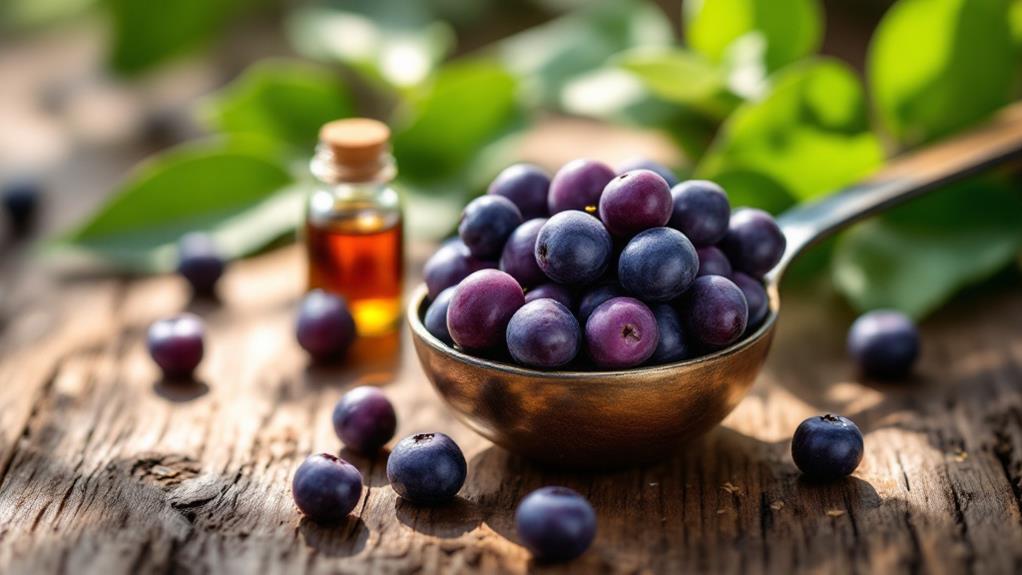
Understanding the right dosage of jambolan is essential to maximizing its benefits while minimizing risks. In regards to jambolan extracts, dosages typically range from 100 mg to 500 mg, depending on the form you choose, such as extract or powder. For teas made from jambolan leaves, using 2 grams per liter of water is generally safe for short-term use. However, it's important to consult with healthcare professionals, especially if you're managing diabetes. They can help tailor your dosage based on your blood glucose levels. Here's a quick guide to help you:
- Follow product label instructions: Adhering to these guidelines guarantees safety and efficacy.
- Consult your pharmacist or doctor: They can provide personalized advice, particularly if you're on diabetes medications.
- Discontinue use before surgery: Stop jambolan intake at least two weeks in advance to avoid blood sugar interference.
- Monitor your blood glucose levels: Regular checks can help adjust dosages as needed.
Culinary and Medicinal Applications
The versatility of jambolan in both culinary and medicinal applications is remarkable. You can enjoy the Java plum fresh, juiced, or mixed into salads and smoothies, making it a fantastic supplement to your culinary creations. Preparing jambolan juice is simple: blend the fruit with water, honey, and spices, aiming for about 100 grams or 3-4 teaspoons daily to reap its nutritional benefits. This delicious fruit is packed with vitamins A, C, and E, and dietary fiber, supporting digestive health and general well-being.
Beyond its culinary applications, jambolan holds significant medicinal properties. In traditional medicine, the seeds and bark are valued for their potential anti-hyperglycemic effects, making them useful for managing diabetes. You might find herbal preparations incorporating these parts to help maintain healthy blood sugar levels. Furthermore, the leaves are used topically for their wound healing abilities and to treat skin conditions, demonstrating jambolan's diverse health benefits.
Incorporating jambolan into your diet not only enriches your meals with flavor but also contributes to your health. Regardless of your objective to improve your dishes or investigate its traditional medicinal uses, jambolan proves to be a valuable ally.



